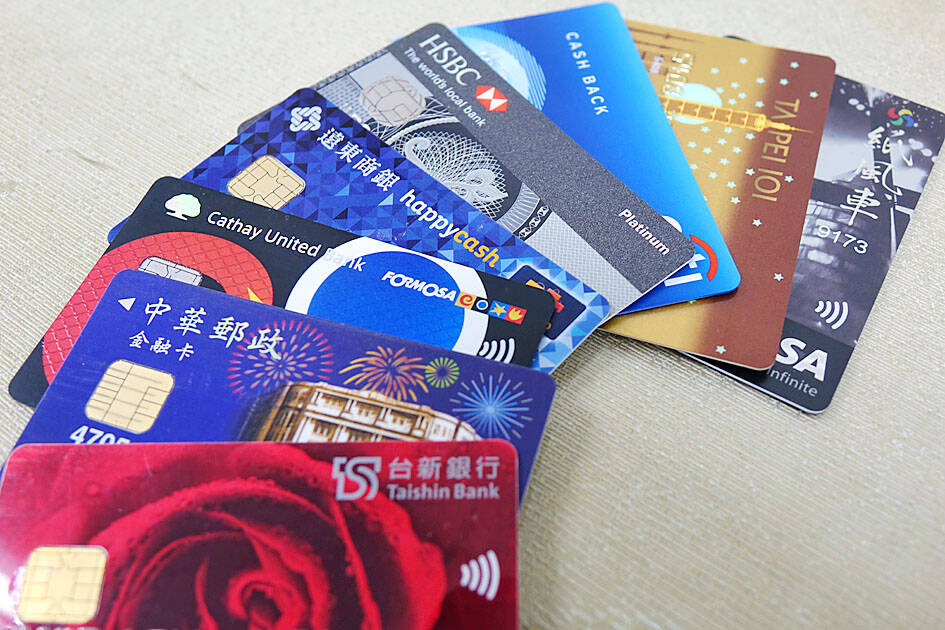Credit card spending hit a record NT$407.9 billion (US$13.2 billion) in July given a rise in their use for tax and travel payments, the Financial Supervisory Commission (FSC) said on Thursday.
The figure rose 54.27 percent from NT$264.4 billion the previous month and was 21.62 percent higher than NT$335.4 billion a year earlier, the commission said.
Taiwanese are being attracted back to credit card spending by incentives and rewards such as installment plans, points or cash-back rewards, Banking Bureau Deputy Director-General Lin Chih-chi (林志吉) said.

Taipei Times file photo
About NT$136.4 billion in taxes were paid by credit card in July, an increase of NT$27.5 billion from a year earlier, Lin said.
Summer vacations and declining COVID-19 infections spurred domestic travel in July, boosting credit card spending for the month, he said.
CTBC Bank (中國信託銀行) led its local peers with credit card spending of NT$86 billion, followed by E.Sun Commercial Bank (玉山銀行) with NT$66 billion and Cathay United Bank (國泰世華銀行) with NT$61 billion, the commission’s data showed.
CTBC Bank issued 115,000 new credit cards in July, the highest number of all local banks, the commission said.
From Jan. 1 to July 31, total credit card spending in Taiwan rose 10 percent year-on-year to NT$1.95 trillion, the highest for the same period over the past five years, the data showed.
“If the momentum continues in following months, this year’s credit card spending might surpass the record of NT$3.22 trillion set in 2019,” Lin said.
As of July, Taiwan had 54.17 million credit cards in circulation issued by 33 financial institutions, up from 53.9 million in June.

UNCERTAINTY: Innolux activated a stringent supply chain management mechanism, as it did during the COVID-19 pandemic, to ensure optimal inventory levels for customers Flat-panel display makers AUO Corp (友達) and Innolux Corp (群創) yesterday said that about 12 to 20 percent of their display business is at risk of potential US tariffs and that they would relocate production or shipment destinations to mitigate the levies’ effects. US tariffs would have a direct impact of US$200 million on AUO’s revenue, company chairman Paul Peng (彭雙浪) told reporters on the sidelines of the Touch Taiwan trade show in Taipei yesterday. That would make up about 12 percent of the company’s overall revenue. To cope with the tariff uncertainty, AUO plans to allocate its production to manufacturing facilities in

Taiwan will prioritize the development of silicon photonics by taking advantage of its strength in the semiconductor industry to build another shield to protect the local economy, National Development Council (NDC) Minister Paul Liu (劉鏡清) said yesterday. Speaking at a meeting of the legislature’s Economics Committee, Liu said Taiwan already has the artificial intelligence (AI) industry as a shield, after the semiconductor industry, to safeguard the country, and is looking at new unique fields to build more economic shields. While Taiwan will further strengthen its existing shields, over the longer term, the country is determined to focus on such potential segments as

TAKING STOCK: A Taiwanese cookware firm in Vietnam urged customers to assess inventory or place orders early so shipments can reach the US while tariffs are paused Taiwanese businesses in Vietnam are exploring alternatives after the White House imposed a 46 percent import duty on Vietnamese goods, following US President Donald Trump’s announcement of “reciprocal” tariffs on the US’ trading partners. Lo Shih-liang (羅世良), chairman of Brico Industry Co (裕茂工業), a Taiwanese company that manufactures cast iron cookware and stove components in Vietnam, said that more than 40 percent of his business was tied to the US market, describing the constant US policy shifts as an emotional roller coaster. “I work during the day and stay up all night watching the news. I’ve been following US news until 3am

COLLABORATION: Given Taiwan’s key position in global supply chains, the US firm is discussing strategies with local partners and clients to deal with global uncertainties Advanced Micro Devices Inc (AMD) yesterday said it is meeting with local ecosystem partners, including Taiwan Semiconductor Manufacturing Co (TSMC, 台積電), to discuss strategies, including long-term manufacturing, to navigate uncertainties such as US tariffs, as Taiwan occupies an important position in global supply chains. AMD chief executive officer Lisa Su (蘇姿丰) told reporters that Taiwan is an important part of the chip designer’s ecosystem and she is discussing with partners and customers in Taiwan to forge strong collaborations on different areas during this critical period. AMD has just become the first artificial-intelligence (AI) server chip customer of TSMC to utilize its advanced